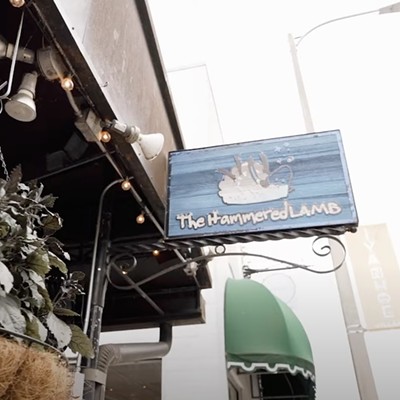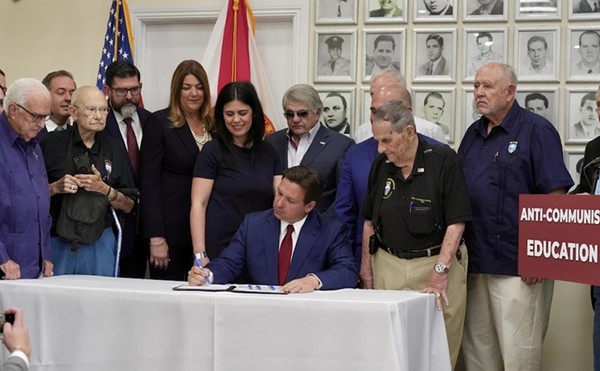Is President Clinton a sex addict? His case helps the cause
Every evening about sundown, a small group of sex addicts swaps stories in a drab little room about a mile from the White House. On torn Naugahyde chairs, they pick apart the most intimate details of their lives, and sometimes, the president's.
"I don't want to wind up like Clinton," a middle-aged man with a $1,000-a-month phone-sex habit recently told the group, "lying to myself, my wife and everyone else."
Many of these self-described sex addicts suspect President Clinton is a sex addict, too. They say that repeated, risky sexual behavior is a symptom of their disease. A Fort Worth family counselor recently asked the 2,000 recovering sex addicts who subscribe to his e-mail newsletter if they thought the president is an addict. Ninety-nine percent of those who responded said "yes."
Dolly Kyle Browning claims she told Clinton the same thing 10 years ago. Browning, who has testified that she had a long-running affair with Clinton while he was governor of Arkansas, recounted a tearful meeting at which she suggested Clinton was a sex addict and asked him: "Have your sexual activities jeopardized your life goals?"
Clinton has denied the alleged affairs. And he quarrels with those who suggest the unfolding scandal is jeopardizing his presidency.
But there's no denying the fact that the Clinton scandal has been good for the sexual-addiction cause. Groups like Sexaholics Anonymous are seeing new faces. Sex therapists and addiction experts are flooded with calls. And a long-simmering debate over whether or not sex addiction is really a disease is finally on the front burner.
"This issue has single-handedly re-ignited the discussion about sex addiction in this country," says Robert Weiss, an addiction specialist and board member of The National Council on Sexual Addiction & Compulsivity. "We couldn't get people to answer our mail before. Now everybody wants to talk about sex addiction."
Amid a culture drenched with sexual imagery, the simple sincerity of the stories sex addicts tell each other is startling. "I was very efficient when it came to relationships," recounts one addict, in a story repeated in recovery literature. "Once I had identified a prospective partner, I moved in quickly, speeding the relationship along to a crescendo which included compulsive phone calls, a total time dedication on my part and eventually a crash-landing, usually on cement. From the ages of 17 to 27, I was never without a relationship, always planning my next target long before the previous relationship had ended."
"I was searching for Mr. Right," says another, "but found only that I had become a hardcore sex addict. The more men I chased and had sex with, the more I seemed to want -- my increasing desperation caused a shift in the kind of person I picked up. I wasn't getting any younger, I reasoned, and I felt driven to settle, to lower my standards in the quality of men I would pick up."
Compulsion is the thread that ties these confidential tales together. Normal people want to have sex. Addicts have to.
"We're not talking about somebody who has the occasional affair on the road here," Weiss says. "We're talking about somebody who has a $1,000-a-week strip-bar habit. Or who masturbates twice a day and has done so every single day of their life. Or a married person who has one affair after another, continually endangering their relationship."
Stories like these led a Boston musician and his wife to form the first Sex and Love Addicts Anonymous meeting in 1976. They adapted the 12-step program created by Alcoholics Anonymous to create a forum in which to talk about compulsive sexual behavior.
By embracing relationship issues as well as sexual behavior, Sex and Love Addicts Anony-mous attracts more women to its meetings than do the other groups. With 1,200 chapters nationwide, it is the largest of five major recovery fellowships.
Members define "sexual sobriety" for themselves. Some avoid all contact with sexual or romantic partners but allow themselves to masturbate. Others maintain a sexual relationship with their spouse while working to stop compulsive fantasizing or masturbation. Many cease all sexual and romantic activities for 90 days, then seek a slow return to healthy sexuality.
Sexaholics Anonymous, by comparison, declared that "any form of sex with one's self or with partners other than the spouse is progressively addictive and destructive." Its strict no-sex-outside-marriage approach appeals to cultural conservatives. Fueled by a 1980 mention in the popular newspaper column "Dear Abby," the group has grown from a small California fellowship to an estimated 600 chapters nationwide.
The other major fellowships are Sex Addicts Anonymous (the most clandestine), Sexual Compulsives Anonymous (popular among gay men) and Sexual Recovery Anonymous. Each evolved independently, some without knowledge that the others existed.
But while these stories play well among addiction aficionados, they draw catcalls from health-care professionals.
"These people are diagnosing themselves -- and each another -- without any effective screening or diagnostic routine," laments Marty Klein, a noted sex therapist who teaches at Stanford University Medical School. "In the medical field, that can be very dangerous. Treating a problem that is not a problem can be as dangerous as not treating a problem that is a problem.
The National Council on Sexual Addiction & Compulsiv-ity defines sexual addiction as "persistent and escalating patterns of sexual behavior acted out despite increasing negative consequences to self and others." Those patterns of behavior commonly include compulsive masturbation, multiple affairs, consistent use of pornography, multiple or anonymous partners, frequent phone- or cyber-sex and the use of prostitutes. Individually, none of these activities suggests addiction. What distinguishes the addict is the inability to stop an ongoing -- and usually escalating -- pattern of self-destructive behavior.
Patrick Carnes, a leading researcher whose book "Don't Call it Love" is frequently cited by other specialists, describes an addictive cycle that includes preoccupation with sexual thoughts, compulsive sexual behavior and then feelings of despair and shame until the cycle begins again.
But sexual addiction is not defined -- nor even mentioned -- in the mother of all mental-health reference books, the Diagnostic and Statistical Manual of Mental Disorders (DSM). Some physicians consider the diagnosis pure quackery. Many psychiatrists view sex addiction as a symptom of obsessive-compulsive disorder, a disease they believe should only be treated under a doctor's care.
Much of the confusion flows from the fact that no one has proven a chemical cause of sexual addiction. Whereas drugs and alcohol are known to trigger addiction by causing measurable changes in brain chemistry, there is no such scientifically proven chemical cause of sexual addiction.
Sex addicts and addictions researchers believe there is a chemical basis for a disease diagnosis. Just about everyone has experienced the rush of adrenaline, rising heart rate, heightened sense of awareness, dilated pupils and sweaty palms commonly associated with sexual arousal. Recovering addicts routinely describe enjoying a trancelike state while fantasizing about a romance, browsing pornography or cruising for prostitutes. Addiction specialists believe that unknown changes in brain chemistry cause sex addicts to become addicted to the chemical arousal, which they grow to experience as a trance.
"Sex addiction is an arousal disorder," Weiss says. "It can be most closely related to gambling addiction. Sexual fantasies and sexual behavior promote neurochemical stimulation in sex addicts in a very similar way that the possibility of winning stimulates arousal in the gambler. In the process, both addicts lose sight of healthy reality."
Gambling addiction is listed in the most recent version of the DSM. Because the mental-health community has already recognized that a self-induced state of arousal can cause negative behavior in that case, addiction researchers believe it is only a matter of time before sexual addiction will similarly be recognized. Asks Weiss: "Are you going to tell me that sexual arousal doesn't have far more potent stimulus for many people than playing blackjack?"
President Clinton's story would fare well with this crowd. He's no stranger to the saccharine jargon of recovery. Like the vast majority of sex addicts, signs of addiction run through his family. Grandmother Edith used morphine. Mother Virginia Kelley gambled. Brother Roger was hooked on cocaine.
Clinton himself has dodged rumors of womanizing ever since the beginning of his political career. Paula Jones' lawyers recently unleashed into the public record an avalanche of seamy depositions, recounting dozens of alleged incidents stretching back to the 1970s. If the substance of these lurid claims is true, then Clinton certainly fits the profile of a sexual addict.
Browning, who has known Clinton since she was 11 years old, is convinced that the man she calls "Billy" is an addict. She claims that she and Clinton had sex "many times" over the course of their long friendship. Browning testified that Clinton was in tears at one point during a May 1988 meeting at a Dallas-Fort Worth Airport hotel, where she asked Billy 20 questions she had learned as part of her own treatment for sexual addiction.
The then-governor grew "visibly upset" when asked, "Have your sexual activities jeopardized your life goals?" according to the deposition. In stories addicts tell each other, it is frequently this type of denouement that causes them to seek treatment.
Clinton has denied having "sexual relations" with Browning, and the others. And he has never responded to media inquiries about sexual addiction. But if the President of the United States were to declare himself a sex addict, he would join a sizeable constituency. The National Association of Sexual Addiction Problems estimates that 6 percent of Americans are sex addicts. That's 14 million people.
Clinton would be whisked to the head of a seemingly endless parade of politicians, movie stars and evangelists who have confessed to sexual addiction after having been caught in compromising positions. After a tabloid published pictures of him with a prostitute, Clinton advisor Dick Morris declared that he was a sex addict. So did the late Michael Kennedy, after admitting to an incident with his baby sitter.
"We've seen this before," Klein says, "the concept of sin as sickness. It has led to sincere attempts to ‘cure' homosexuality, nymphomania and masturbation by the world's leading social scientists, within our own lifetime." Klein and other opponents of the diagnosis fear the sexual-addiction model provides scientific cover for conservatives who would impose their morals on the public. "The sexual addiction concept shows a dramatic ignorance of the range of human sexuality."
Recovering addicts say the concept works, regardless of medical or cultural flaws. They are thankful for the publicity Clinton has generated for their cause. It took until 1980 for the DSM to quit defining homosexuality as a disease; sex addicts expect it will take years before their diagnosis is included.
"Sexual addiction is where alcoholism was 50 years ago," Weiss says. "A lot of shame. A lot of secrecy. A belief that only really sick people have this problem. A belief that women don't have this problem. The mental-health community believed they could solve it through psychotherapy. That's where alcoholism was. And that's exactly where sex addiction is now."
Sidebar: Are you a sex addict?
Answer these 12 questions to assess whether you may have a problem with sexual addiction.
1. Do you keep secrets about your sexual or romantic activities from those important to you? Do you lead a double life?
2. Have your needs driven you to have sex in places or situations or with people you would not normally choose?
3. Do you find yourself looking for sexually arousing articles or scenes in newspapers, magazines or other media?
4. Do you find that romantic or sexual fantasies interfere with your relationships or are preventing you from facing problems?
5. Do you frequently want to get away from a sex partner after having sex? Do you frequently feel remorse, shame or guilt after a sexual encounter?
6. Do you feel shame about your body or your sexuality, such that you avoid touching your body or engaging in sexual relationships? Do you fear that you have no sexual feelings, that you are asexual?
7. Does each new relationship continue to have the same destructive patterns which prompted you to leave the last relationship?
8. Is it taking more variety and frequency of sexual and romantic activities than previously to bring the same levels of excitement and relief?
9. Have you ever been arrested or are you in danger of being arrested because of your practices of voyeurism, exhibitionism, prostitution, sex with minors, indecent phone calls, etc.?
10. Does your pursuit of sex or romantic relationships interfere with your spiritual beliefs or development?
11. Do your sexual activities include the risk, threat or reality of disease, pregnancy, coercion or violence?
12. Has your sexual or romantic behavior ever left you feeling hopeless, alienated from others or suicidal?
If you answered yes to more than one of these questions, we would encourage you to seek out additional literature as a resource or to attend a Sex Addicts Anonymous meeting to further assess your needs.
This quiz is available on the Sex Addicts Anonymous website. Similar tests are available online from Sexaholics Anonymous and and Sexual Compulsives Anonymous. (See sidebar for addresses.)
Sidebar:Where to go for help
The National Council on Sexual Addiction & Compulsivity is a private, nonprofit organization that provides access to education, information and referral resources.
1090 Northchase Parkway, Suite 200 South, Marietta, GA, 30067 (770) 989-9754. http://www.ncsac.org
Ask Me Anything is a website put together by California sex therapist Marty Klein. The site includes Klein's article: "Why There's No Such Thing as Sexual Addiction."http://www.sexed.org/index.htm
Check the local phone book for sexual recovery 12-step groups. Here are their national contacts: "Sex & Love Addicts Anonymous (SLAA)"(617) 332-1845 (no website)
Sexaholics Anonymous (SA) (615) 331-6230 http://www.sa.org
Sex Addicts Anonymous (SAA) (713) 869-4902 http://www.sexaa.org
Sexual Compulsives Anonymous (SCA) (800) 977-HEAL http://www.sca-recovery.org
Sexual Recovery Anonymous (SRA) (212) 340-4650 (no website)


















